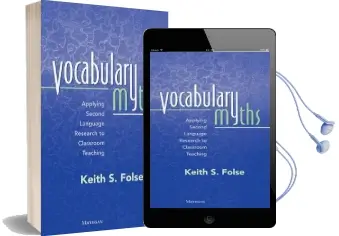Vocabulary Myths: Applying Second Language Research to Classroom Teaching [Audiobook] download free by Keith S. Folse

- Listen audiobook: Vocabulary Myths: Applying Second Language Research to Classroom Teaching
- Author: Keith S. Folse
- Release date: 2004/12/28
- Publisher: THE UNIVERSITY OF MICHIGAN PRESS
- Language: English
- Genre or Collection: Teaching Resources and Education
- ISBN: 9780472030293
- Rating: 9.92 of 10
- Votes: 186
- Review by: Averie Keeney
- Review rating: 8.83 of 10
- Review Date: 2018/9/7
- Duration: 2H28M33S in 256 kbps (40 MB)
- Date of creation of the audiobook: 2018-09-08
- You can listen to this audiobook in formats: MPEG4, TTA, MPEG-4 ALS, WAV, FLAC, MP3, WMA (compression EML, RAR, TAR.7Z, ZIP)
- Total pages original book: 200
- Includes a PDF summary of 24 pages
- Duration of the summary (audio): 17M45S (4.8 MB)
- Description or summary of the audiobook: In Vocabulary Myths, Keith S. Folse breaks down the teaching of second language vocabulary into eight commonly held myths. In debunking each myth, he introduces the myth with a story based on his 25 years of teaching experience (in the United States and abroad), continues with a presentation of what empirical research has shown on the topic, and finishes with a list of what teachers can do in their classrooms to facilitate true vocabulary acquisition. The goal of Vocabulary Myths is to foster a paradigm shift that correctly views vocabulary as fundamental in any second language learning process and demonstrates that research supports this goal-that in fact there is a wealth of empirical evidence to support these views. In addition, an important theme is that teachers have overestimated how much vocabulary students really understand, and as a result, the so-called 'comprehensible input' is neither comprehensible nor input. The second language vocabulary acquisition myths reexamined in this book are: In learning another language, vocabulary is not as important as grammar or other areas. Using word lists to learn L2 vocabulary is unproductive. Presenting new vocabulary in semantic sets facilitates learning. The use of translations to learn new vocabulary should be discouraged. Guessing words from context is an excellent strategy for learning L2 vocabulary. The best vocabulary learners make use of one or two really specific vocabulary learning strategies. The best dictionary for L2 learners is a monolingual dictionary. Teachers, textbooks, and curricula cover L2 vocabulary adequately.
- Other categories, genre or collection: Teaching Of A Specific Subject, Teaching Of Students With English As A Second Language (TESOL), ELT: Specific Skills, Language Learning: Specific Skills, ELT: Learning Material & Coursework, Linguistics
- Download servers: 4Shared, Uploaded, Dropbox, Mediafire, Google Drive, Krakenfiles, Openload, Microsoft OneDrive. Compressed in EML, RAR, TAR.7Z, ZIP
- Format: Paperback
- Approximate value: 27.27 USD
- Dimensions: 152x229x13mm
- Weight: 154g
- Printed by: Not Available
- Published in: Ann Arbor, United States
-
What Your Fifth Grader Needs to Know: Fundamentals of a Good Fifth-Grade Education
E D Hirsch
356 Pages
-
Scaling Lean & Agile Development: Thinking and Organizational Tools for Large-Scale Scrum
Craig Larman
368 Pages







































































































